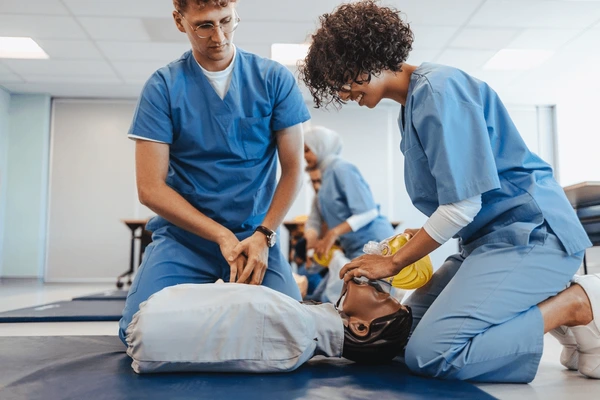In today’s fast-paced and unpredictable world, emergencies can happen at any moment. Whether it’s a sudden cardiac arrest, choking incident, or a near-drowning, being equipped with the knowledge of cardiopulmonary resuscitation (CPR) can make the difference between life and death. CPR is a life-saving technique that combines chest compressions and rescue breaths to maintain blood flow and oxygenation in a person experiencing a medical emergency. Obtaining CPR certification is not just a valuable skill but a responsibility in today’s world. Here are the top five reasons why CPR certification is essential:

Immediate Response Saves Lives:
In medical emergencies, time is of the essence. The quicker someone receives CPR, the higher their chances of survival. Immediate initiation of CPR can help maintain vital blood flow to the heart and brain until professional medical help arrives. The American Heart Association emphasizes the importance of starting CPR within the first few minutes after a person’s heart stops beating. By being CPR certified, individuals can step in confidently during those critical moments, providing crucial support until emergency medical services arrive.
Increased Preparedness in Public Spaces:
Emergencies can happen anywhere – at work, in a shopping mall, or even at a community event. CPR certification ensures that individuals are prepared to respond to emergencies in various public spaces. With more people trained in CPR, the overall safety net in communities expands. Schools, workplaces, and public places benefit from having a trained pool of individuals who can take immediate action in case of a medical emergency. This increased preparedness not only saves lives but also fosters a sense of security within communities.
Empowering Bystanders to Act:
In many emergency situations, bystanders may be the first on the scene. CPR certification empowers individuals to overcome the fear and hesitation that often accompanies witnessing a medical crisis. By knowing what to do and having the confidence to act, certified individuals become a crucial link in the chain of survival. Training programs not only cover the technical aspects of CPR but also address the psychological and emotional aspects of responding to an emergency, providing a deeper understanding of the . This empowerment can have a cascading effect, inspiring others to seek CPR training and contribute to a culture of safety.
Comprehensive Life Skills Training:
CPR certification goes beyond teaching a singular life-saving technique. It often includes valuable training in first aid, automated external defibrillator (AED) use, and basic emergency response. This comprehensive training equips individuals with a range of life-saving skills that can be applied in various situations. From addressing injuries and wounds to understanding how to use AEDs effectively, CPR certification provides a well-rounded education in emergency response. These skills are not only essential in critical situations but also valuable in day-to-day life, making certified individuals more confident and capable in handling unexpected challenges.
Professional and Personal Development:
CPR certification is not only about being prepared for emergencies but also about personal and professional development. Many employers and organizations recognize the value of employees with CPR certification. Having certified staff can enhance workplace safety and meet regulatory requirements in certain industries. Moreover, individuals with CPR certification often gain a sense of fulfilment and purpose, knowing that they have the ability to make a significant impact in emergency situations. This added sense of responsibility and accomplishment can contribute to personal growth and resilience.
In conclusion, CPR certification is more than just a skill – it’s a crucial aspect of responsible citizenship in today’s world. The ability to respond effectively in an emergency can mean the difference between life and death. By becoming CPR certified, individuals not only enhance their own preparedness but also contribute to the safety and well-being of their communities. In a world where unforeseen events can occur at any time, being equipped with the knowledge and skills of CPR is a powerful step towards creating a safer and more resilient society.